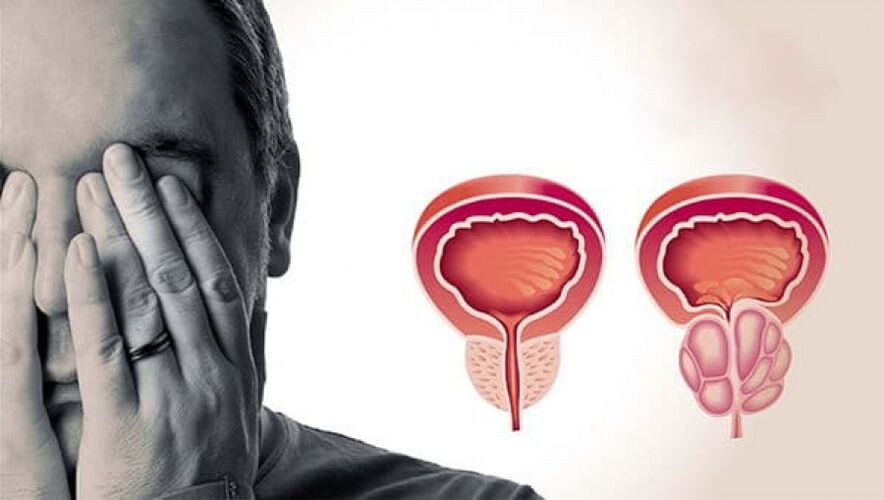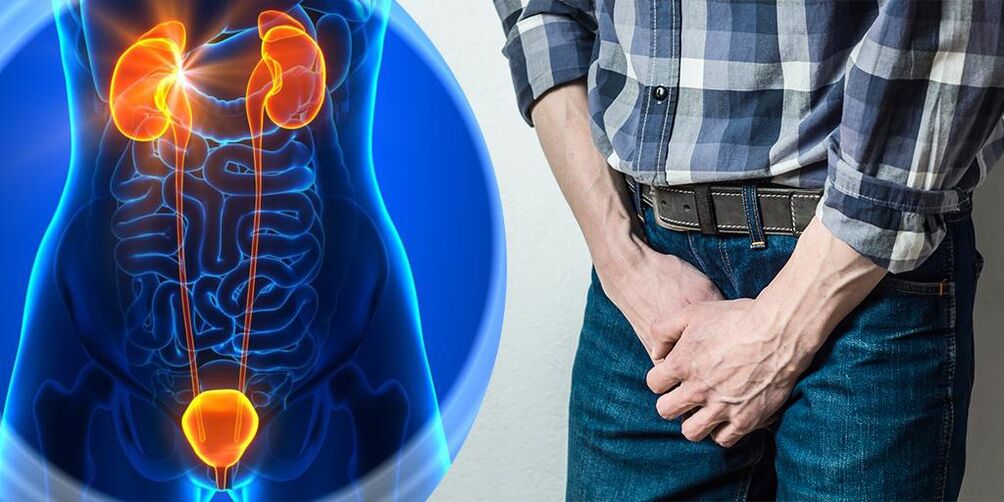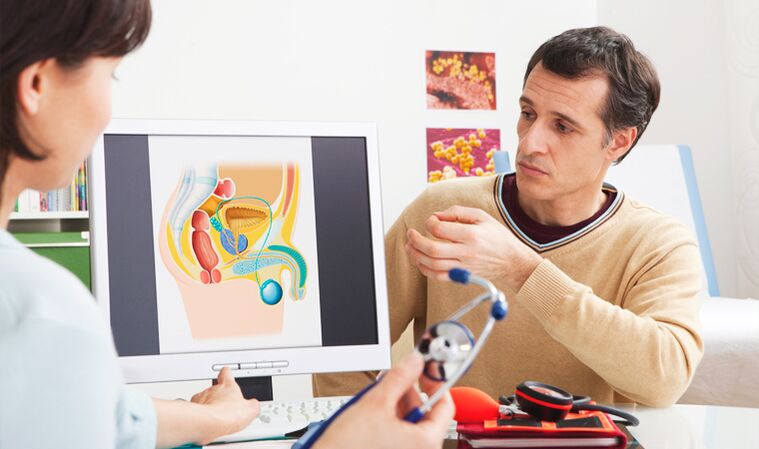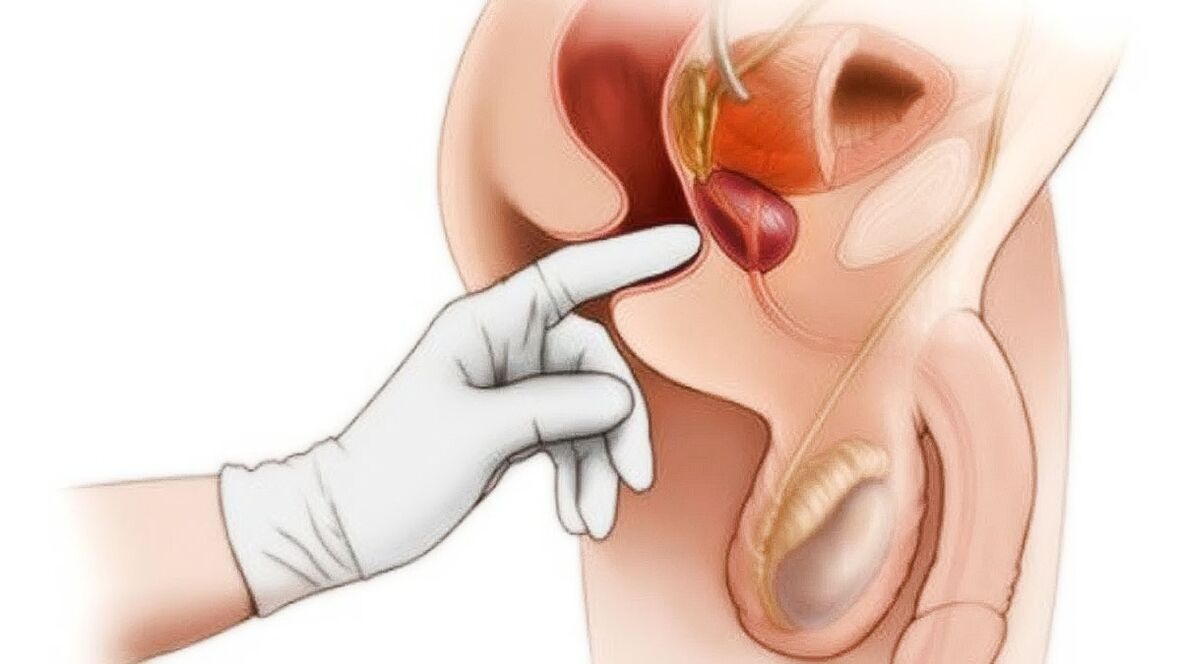More than half of the male population suffers in prostatitis. This disease is characterized by the development of the inflammatory process in the prostate gland. The disease is in an acute or chronic form. Young men are occurring at the age of 20-45. But not everyone knows how prostatitis manifests itself and why inflammation develops. The easy attitude towards the disease makes one of the most common men.
The causes of illness
The inflammatory process of the prostate is most often due to bacterial infection. There is no accurate reason for prostatitis as the likelihood of inflammation of the prostate tissue increases with the weakening of immunity. Pathology may be staphylococci, E. coli, enterococci, pseudomonas.
These infectious agents are on a healthy person's mucosal membranes and skin, but in the case of prone factors, they can cause the inflammatory process:
- Sexual life: rare sexual relationships, interrupted sexual actions with incomplete ejaculation;
- hypothermia;
- sedentary lifestyle;
- stagnant phenomena in pelvic organs;
- frequent urological diseases, sexually transmitted infections;
- voltage;
- wearing a narrow clothing that presses a person's genitals;
- chronic alcohol poisoning, medicines, chemicals;
- Crotch injuries;
- Reducing immunity.
The main symptoms of prostatitis depend primarily on the form of the disease (acute, chronic). Prostate inflammation is recommended to be treated on time, otherwise the disease will be delayed and regularly declines. Therefore, all people need to know how prostatitis begins and what signs they have to translate first and foremost.
The etiology of chronic prostatitis
Chronic prostatitis develops in the background of acute inflammation of the prostate. During remission, one is worried about the poor pain of the perineum, increasing during urination, emptying and intimacy. Smaller mucosa secretions from the urethra may occur with stress.
Causes of exacerbation of chronic prostatitis can be any factor: stress, forced restrictions on the rectum or bladder, and to wear narrow lower flax infections. During aggravation, pathological properties can only increase slightly, with increased body temperature and insignificant hyperthermia. Men with chronic inflammation of the prostate is exposed to a frequent downturn of the disease. The cause of the disease may also be the cause of the pelvis in the short -term stagnant phenomena.
The form and symptoms of acute prostatitis
What signs of prostatitis in men depend on the form of the disease. Acute inflammation appears in the gland primary. There are three forms of the disease: cataral, follicular and parenhimal. The latter is the hardest. Men often do not know the symptoms of the onset of the inflammatory process by prostatitis.
So what signs of prostatitis need to be paid special attention? The initial manifestation of the disease:
- Pulling pains in the perineum and in the lame;
- discomfort during urination, after intimate relationships;
- fracture, weakness;
- A slight increase in temperature.
The cataral stage of prostate inflammation is considered the simplest, but home treatment is contraindicated. Processing can lead to a chronic inflammatory process. Healers or acquaintances cannot use tips without prior consultation with a doctor, as the urologist can prescribe the most effective and appropriate treatment.
Folicular inflammation occurs more acutely. Strong pains occur in the legs and penis, and discomfort can cover the entire lumbar region. The main feature of this form of prostatitis is a painful pain in men, which does not allow the rectum and bladder to be completely emptied. This type of inflammation of the prostate develops acute urinary tract retention and the patient's quality is interrupted. With early treatment, the disease can be placed in the next stage - parenhimal.

The parenhimal form of the disease
Symptoms of prostatitis in parenhimal men:
- severe condition of the patient;
- At the beginning of the disease, rapid urination moves rapidly into dysuria (whole urinary retention);
- Appetite decreases, the patient is thirsty for the patient;
- bloating, inability to empty the intestines due to severe pain;
- The mucosa from the rectum may appear;
- Body temperature increases and is kept within 39C.
One sign of prostatitis in such severe shaped men is the sharp pain of the prostate during probing. At this stage of the inflammatory process, the patient's pipator examination is difficult due to a difficult condition and the sexual feelings in the sexual area. If the qualified treatment does not begin at this stage, the disease can be complicated by the transition to adjacent organs, the appearance of the abscess or the development of the chronic inflammatory process.
If acute inflammation develops in the background of the urethra, urolithiasis and other pathologies of the urinary tract, blood contamination may appear in the urine, and experts often find traces of protein. Urine delay requires urgent medical attention. The disease is characterized by an acute beginning, which generally deteriorates the well and intense pain in the pubic area. Body temperature usually rises. The appearance of joint and muscle pain is possible in the background of severe intoxication.
The process of chronic prostatitis
When the symptoms of chronic prostatitis appear, men do not always go to hospital. The painful pain is relatively easy to transfer and patients are in no hurry to consult with a urologist. Although there are less prominent symptoms of human chronic prostatitis than the acute form of inflammation, the disease directly threatens the patient's reproductive and sexual abilities. And the chronic form of pathology is longer and, in some cases, requires surgical intervention.
Symptoms of prostatitis in males of chronic form:
- Pain pain, painful pain, over the pub, perineum, during urination, after intercourse;
- It is a bit difficult to urinate, the main symptom of chronic prostatitis is the flow of urine.
- the appearance of emissions from the urethra after hard work or emptying;
- Damaged sexual function.
In the case of chronic prostatitis, the temperature remains normal. But during aggravation, the appearance of feverish syndrome is possible. Generally, the temperature of 37 degrees prostatitis indicates a slow inflammatory process. Quite dangerous, especially for a person's reproductive health.
Chronic inflammation is usually manifested unnoticed, usually only by frequent urination and violation of erection. Remissions are replaced by relapses, but many people rather do not handle their sensitive problem with a urologist, which indicates extremely irresponsible. The disease can lead to infertility even in young men, and the symptoms of prostate inflammation are sometimes hidden by prostate cancer.

Diagnostic methods
When men have the first signs of prostatitis, the urologist performs an external examination, exploring the prostate through the rectum, determining the dimensions of the affected organ, its structure and density. During palpation, the physician's movement should be as careful as possible.
Further diagnostic methods for the symptoms of men's prostate inflammation:
- studying the secret of the prostate;
- laboratory diagnostics;
- PCR research;
- Prostate ultrasound;
- Urofloometry;
- Magnetic resonance, computer tomography of pelvic organs.
We recommend that signs of inflammation of the prostate be examined. This prevents complications in which erectile dysfunction, hyperplasia and infertility are often found. Studying the causes and symptoms of prostatitis can be found in the competence of the urologist. It is also worth contacting smaller signs of prostate disease.
Characteristics of treatment
Many patients make a common mistake - they start using folk drugs, delaying the development of the disease and increasing the risk of complications. The treatment system is selected on a strictly individual basis, only after the determination of the pathogen and the real cause of the inflammation, the elimination of the harmful factor - smoking, pyelonephritis, violation of erection, hypothermia.
Inflammation of the etiology of the virus is treated using antiviral drugs. Prostate inflammation provoked by chlamydial infection requires the treatment of antibacterial drugs. They pay great attention to strengthening immunity.
Treatment should not be treated at home in any case, as conventional medicine is impossible to cure the disease in acute form. The chronic inflammatory process requires the intervention of experienced professionals. Modern treatment drugs allow you to quickly and effectively relieve the inflammatory process and avoid the development of dangerous complications.
Medication
The following bases are used to treat prostate inflammation:
- antibacterial, antifungal, antitricomonna drugs (depending on the cause of the disease);
- Antispasmodics, painkillers;
- Physiotherapy methods.
Therefore, urologists recommend that you contact doctors as soon as the first signs of prostatitis occur in one person. This will win the time. Treatment with home improvised tools is strictly contraindicated.
All people with prostate disease require effective urological care. Qualified urologists use proven drugs and modern therapeutic methods. Antibacterial drugs are used during treatment that easily penetrate the prostate tissue. Special therapy is indicated during intoxication.
Physiotherapy treatment is also used. It is used when signs of prostatitis disease are not prevented and to prevent relapse. Any techniques used by professionals should be selected, taking into account the unique characteristics of human health.

Prostate massage
Chronic inflammatory patients of the prostate massage the gland. This procedure can only be performed by experienced professionals, as it is a huge treatment that improves the flow of purulent inflammatory secrets from channels.
Prostate massage refers to a complex treatment and diagnostic procedure that only professionals have to perform. It is executed through the rectum. The organ wires are massaged with fingers, stimulating blood circulation and the outflow of the prostate secret, which is required for many diseases of the Gengiturinary sphere. Massage relieves channels from pus accumulation, removes stagnation, and reduces manifestations of inflammatory processes.
Potential complications
If you do not pay attention to the signs and symptoms of prostatitis, the infection is the appearance of other organs of the pelvic region, the intense pain of urination, and the appearance of blood and PU -K in urine and pus. In a neglected form, the temperature of men's prostatitis rises and well -being is noticeably deteriorating.
Main complications of prostatitis:
- vesiculite (inflammation of seed bubbles);
- prostate sclerosis;
- prostate abscess;
- prostate cysts;
- infertility;
- impotence;
- Purulent infections of adjacent organs.
Any complication can interfere with reproductive function and provoke sexual disorders. Chronic inflammation is particularly dangerous. In contrast to the background, the urethral structures often arise and decrease qualitative and quantitative indicators of the seminar fluid. And this endangers the development of infertility in the future.
However, the most frightening complication is considered to be the hyperplasia of the gland, increasing the risk of growth of malignant tumors. People often do not even know the growth of adenoma and cancer tumors until they reach the stunning size and there are no difficulties in urination.
Preventive measures
Preventing inflammation of the prostate gland is aimed at eliminating the influence of negative external and internal factors. It is recommended to avoid unprotected sexual relationships that lead to sexually transmitted diseases that damage to prostate tissues, as well as hypothermia and radial effects on the body.
Fold off overly close pants and underwear that squeezes the pelvis. The stagnation process of the genitourinary organs contributes to the active reproduction of pathogenic microorganisms and to the development of infectious diseases. It is also important to empty the bladder in time. One method of prevention is measured and regular sexual life is measured. Long -term abstinence leads to stagnation of blood and causes an inflammatory reaction.
With the first clinical manifestations of prostate diseases, an early appeal to the urologist allows you to prevent the chronic course of inflammatory processes and hazardous complications. It is much easier and easier to treat acute prostatitis than to treat extended processes of the disease.























